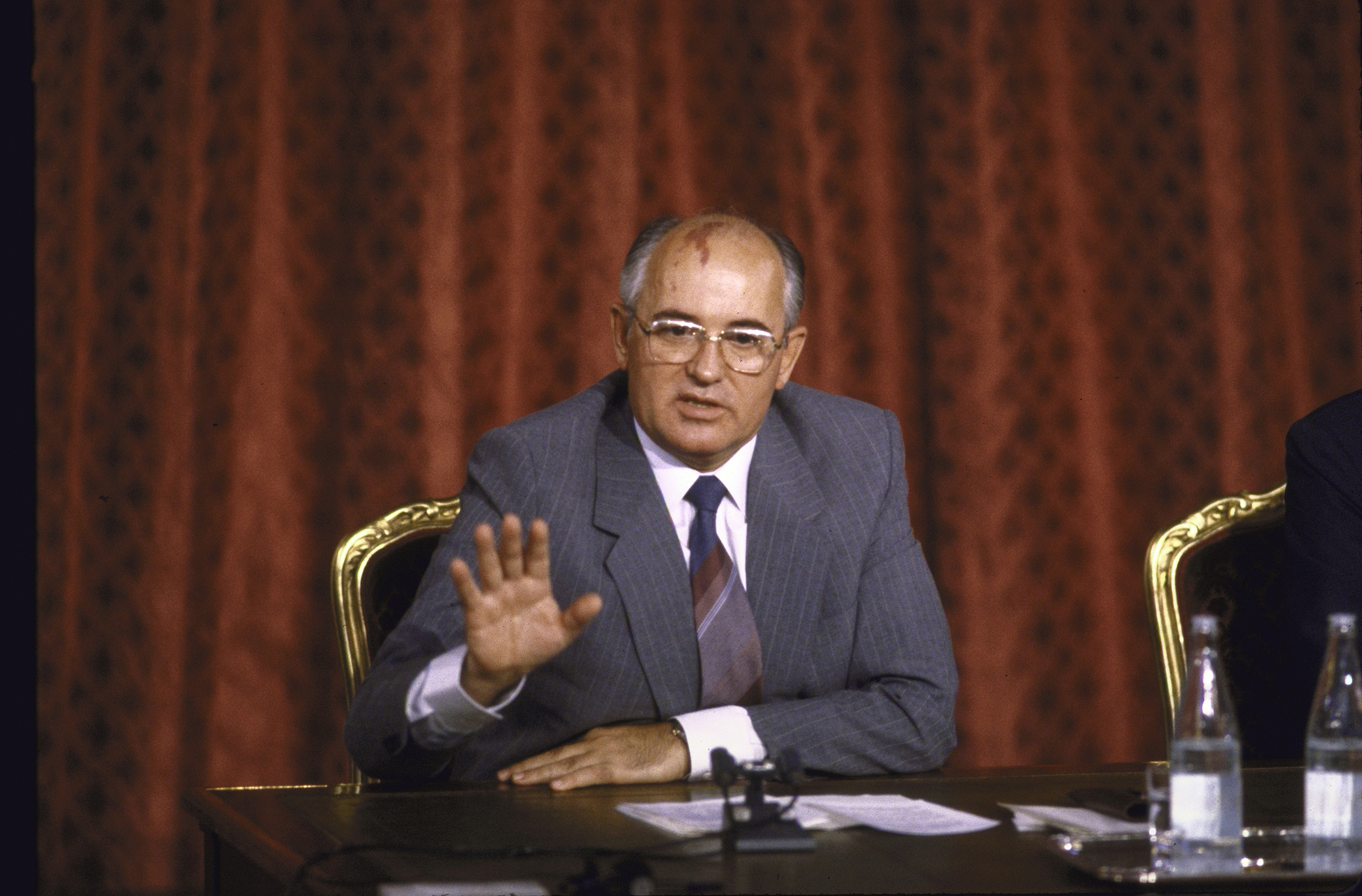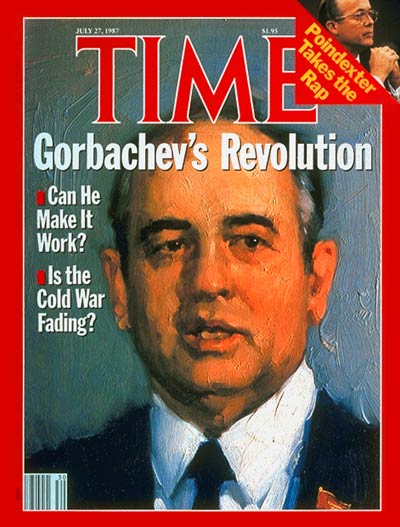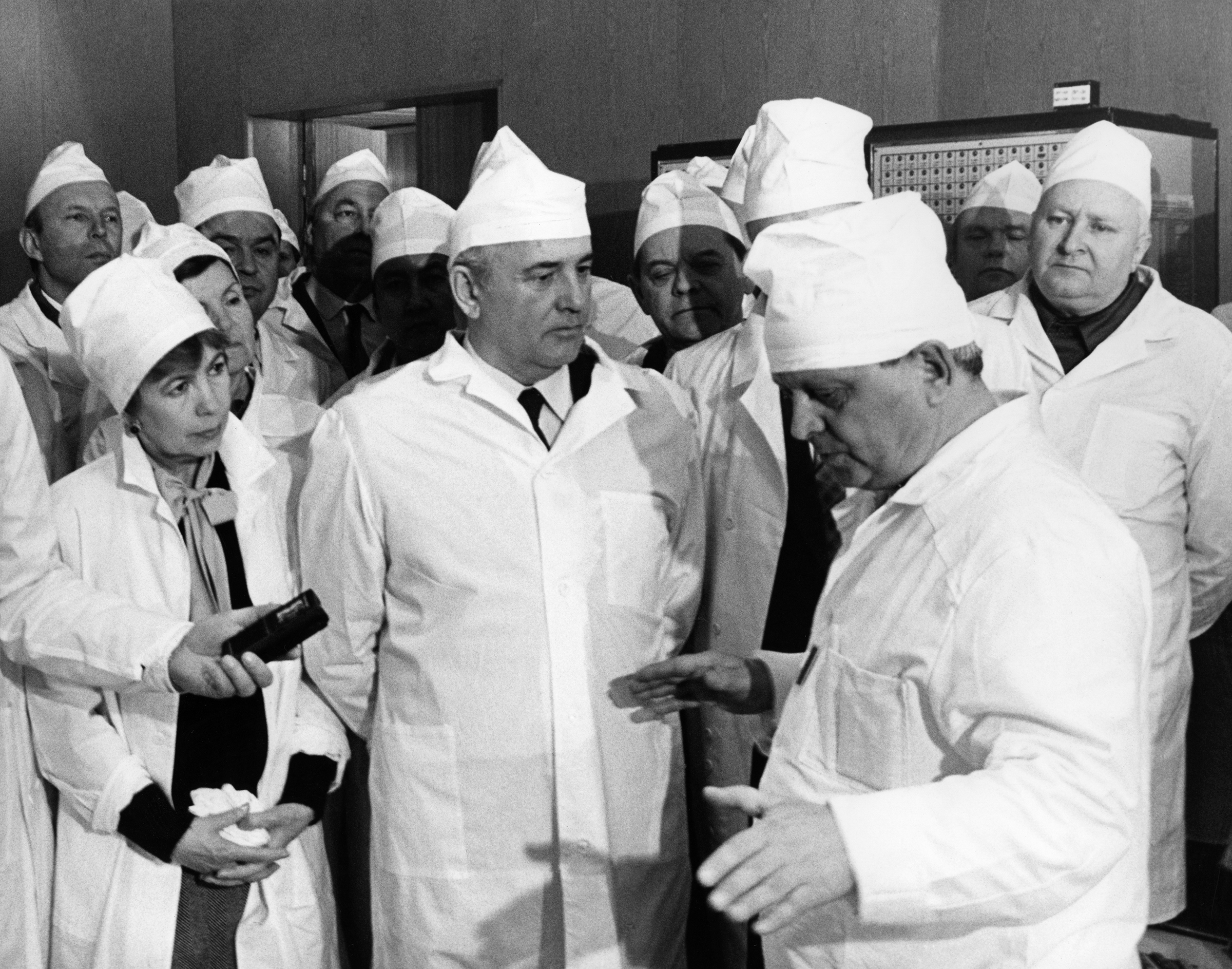
Countless words will be dedicated in the following days to Mikhail Gorbachev, the Soviet leader who died Aug. 30 at the age of 91. But throughout his obituaries, two specific words will likely be repeated: glasnost and perestroika. Those two transliterations of Russian words were synonymous with his campaign for reforming Soviet society through policies, and the latter was the title of his 1982 book Perestroika: New Thinking for Our Country and the World.
But what do they actually mean?
Shortly after Gorbachev became the General Secretary of the Communist Party of the Soviet Union in 1985, he ramped up talk about glasnost—meaning “openness,” particularly openness of information—and perestroika, meaning a “restructuring,” specifically of the Communist economy and political system. The terms went hand-in-hand because, together, the reforms they described would make the Soviet Union more democratic and incorporate some features of capitalism to revitalize the economy.
In more concrete terms, glasnost was supposed to translate into a loosening of state censorship of the media — “‘Those who attempt to suppress the fresh voice, the just voice, according to old standards and attitudes, need to get out of the way,'” as TIME reported Gorbachev saying in a July 1986 speech.
Perestroika was supposed to translate into the incorporation of some features of a market economy into the Soviet economy, by loosening price controls, encouraging more entrepreneurism and limited private businesses, and by making imported consumer goods easier to purchase, as TIME explained to readers in 1989. “It is particularly important that the actual pay of every worker be closely linked to his personal contribution to the end result, and that no limit be set,'” he said in a 1987 speech.
In a July 27, 1987 cover story, TIME dubbed the policies “Gorbachev’s Revolution” and described the “chilly dawn of reform” spreading in Soviet society: “Mikhail Gorbachev’s calls for glasnost (openness), demokratizatsiya (democratization) and perestroika (restructuring) have become the watchwords of a bold attempt to modernize his country’s creaky economic machinery and revitalize a society stultified by 70 years of totalitarian rule.” As a footnote clarified, “In current Soviet parlance, [glasnost]’s meaning is not so much openness as public airing or public disclosure.”

The factors that went into the development of those policies were many.
For example, in the wake of the 1986 Chernobyl disaster, Soviet news outlets produced what TIME called “unprecedented candor” about the mismanagement of the nuclear power plant. Even the newspaper Pravda, the “official voice of the Communist party,” as TIME put it “dropped the rosy prose” and photos of happy workers “in favor of a strong slap at Soviet incompetence, confusion and cowardice” as it reported on officials who left their posts after the accident and the firing of the plant’s director and chief engineer. That openness about what had gone wrong—turning to the truth rather than to propaganda—was just one hint at the coming of glasnost.
Get your history fix in one place: sign up for the weekly TIME History newsletter
As for perestroika, that involved, as the magazine put it, “making the Soviet Union an economic superpower as well as a military one.” It meant modernizing Soviet factories and forging business partnerships with the West. (For example, Bloomingdale’s department store in New York City started selling Soviet rye bread in 1989.) TIME also reported that Gorbachev’s effort to get a handle on the high levels of alcoholism in the Soviet Union—by raising the drinking age from 18 to 21, shortening liquor store hours and raising the prices of vodka—were a “perestroika of the personality,” an attempt to restructure individuals.

Gorbachev himself provided one view of the effectiveness of the policies in an interview with TIME around the 20th anniversary of those words becoming part of the international lexicon. “Seventy-seven percent of Russians say they want to live in a free and democratic country,” he said. “That is the legacy of perestroika.” The idea of glasnost also empowered the Russian LGBTQ community—which has been threatened by recent anti-gay government policies—to speak more openly about sexuality.
But the change was not immediate, or total.
Some U.S. businesses initially weren’t eager to work with Soviet companies, feeling that their values still weren’t aligned and that there wasn’t enough profit in it anyway, given currency conversion issues with rubles. “Many Americans believe that helping strengthen the Soviet Union could damage U.S. interests,” TIME reported in 1988. “And because of Western security concerns, many U.S. commercial technologies will remain off limits to ventures with the Soviets… Imports of Soviet goods to the U.S. are inhibited by an American law that withholds favorable trading status from certain countries practicing repressive emigration policies. Result: the Soviets have turned to West Germany, Japan and other industrial partners for investment capital and production expertise… Meanwhile, their Western partners, who are mainly eager to sell products and services in the Soviet Union, must cope with the nonconvertibility of Soviet currency. No matter how profitable a Soviet joint venture may be, U.S. companies have little use for rubles.”
As a result, there were shortages ranging from fresh fruit to clothing, but the policies were part of a movement that would change the Soviet Union—and 20th century history—irrevocably.
The Soviet Union’s legendary poet Yevgeny Yevtushenko described how perestroika and glasnost went hand in hand to TIME in 1987, and his take arguably still rings profound, more than three decades later: “One could describe glasnost metaphorically as the air above and the national economy as the earth below. It is easier and faster to refresh the air than it is to turn and fertilize the earth, yet purified air is necessary before healthy changes can be made in the earth. So it is too early for us to speak of economic triumphs, and unlike the old days, nobody is making any messianic promises. We must wait for the earth to absorb the air, and be enriched.”
More Must-Reads from TIME
- Cybersecurity Experts Are Sounding the Alarm on DOGE
- Meet the 2025 Women of the Year
- The Harsh Truth About Disability Inclusion
- Why Do More Young Adults Have Cancer?
- Colman Domingo Leads With Radical Love
- How to Get Better at Doing Things Alone
- Michelle Zauner Stares Down the Darkness
Write to Olivia B. Waxman at olivia.waxman@time.com